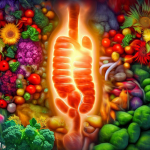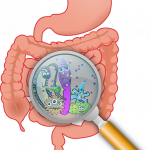Irritable bowel syndrome (IBS) is a common digestive disorder that affects millions of people worldwide. It is a chronic condition that can cause discomfort, pain, and other symptoms that can significantly impact a person’s quality of life. While there are medications available to manage IBS symptoms, many people prefer natural remedies to avoid potential side effects and promote overall gut health.
What is IBS?
 IBS is a functional gastrointestinal disorder that affects the large intestine. It is characterized by a group of symptoms that can include abdominal pain, bloating, constipation, diarrhea, and changes in bowel habits. There are three types of IBS: IBS with constipation (IBS-C), IBS with diarrhea (IBS-D), and mixed IBS (IBS-M). The prevalence of IBS varies depending on the population studied, but it is estimated to affect up to 20% of adults in developed countries.
IBS is a functional gastrointestinal disorder that affects the large intestine. It is characterized by a group of symptoms that can include abdominal pain, bloating, constipation, diarrhea, and changes in bowel habits. There are three types of IBS: IBS with constipation (IBS-C), IBS with diarrhea (IBS-D), and mixed IBS (IBS-M). The prevalence of IBS varies depending on the population studied, but it is estimated to affect up to 20% of adults in developed countries.
Causes of IBS
The exact cause of IBS is unknown, but there are several factors that may contribute to its development. These include genetics, diet, stress, gut microbiome imbalances, and abnormalities in the gut-brain axis. Research has shown that people with IBS have alterations in their gut microbiome compared to healthy individuals. Stress can also play a significant role in triggering or exacerbating IBS symptoms.
Symptoms of IBS
The most common symptoms of IBS include abdominal pain or discomfort, bloating, gas, constipation, diarrhea, and changes in bowel habits. These symptoms can significantly impact a person’s quality of life and may lead to anxiety or depression. IBS can also affect gut health by altering the gut microbiome and increasing inflammation in the gut.
Natural Remedies for IBS
There are several natural remedies that may help manage IBS symptoms and promote overall gut health. Herbal remedies such as peppermint oil, ginger, and chamomile have been shown to reduce IBS symptoms. Probiotics can also be beneficial for IBS by restoring gut microbiome balance. Acupuncture and mind-body therapies such as yoga and meditation may also help manage stress and reduce IBS symptoms.
Diet Changes to Help Heal Your Gut
Diet plays a significant role in managing IBS symptoms. Foods that are high in FODMAPs (fermentable oligosaccharides, disaccharides, monosaccharides, and polyols) can trigger IBS symptoms in some people. These include foods such as onions, garlic, wheat, and dairy products. On the other hand, foods that are high in fiber such as fruits, vegetables, and whole grains can help regulate bowel movements and promote gut health. It is also essential to stay hydrated to prevent constipation.
Supplements to Help Heal Your Gut
Supplements can be beneficial for managing IBS symptoms and promoting gut health. Probiotic supplements can help restore gut microbiome balance, while digestive enzyme supplements can aid in the digestion of food. Magnesium supplements may also help regulate bowel movements, while vitamin D supplements may reduce inflammation in the gut.
Lifestyle Changes to Help Heal Your Gut
Lifestyle changes such as exercise, stress management techniques, and getting enough sleep can also help manage IBS symptoms and promote overall gut health. Exercise can improve bowel function and reduce stress levels. Stress management techniques such as deep breathing exercises or mindfulness practices can help reduce anxiety and promote relaxation. Getting enough sleep is also essential for overall health and may help reduce inflammation in the gut.
IBS is a common digestive disorder that can significantly impact a person’s quality of life. While there are medications available to manage IBS symptoms, many people prefer natural remedies to avoid potential side effects and promote overall gut health. Natural remedies such as herbal remedies, probiotics, acupuncture, and mind-body therapies can be beneficial for managing IBS symptoms. Diet changes, supplements, and lifestyle changes such as exercise, stress management techniques, and getting enough sleep can also help promote gut health. It is essential to seek medical advice if you suspect you have IBS to rule out other potential underlying conditions.








